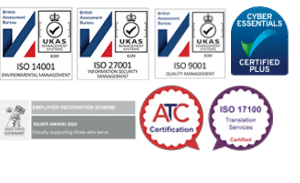It’s safe to say that no one could have predicted the unfolding events of 2020. The effect the coronavirus pandemic has forced many to adapt the way we work and live.
Law firms are no exception. As remote working becomes more a part of working life, it’s understandable that innovation of technologies and services have followed suit to accommodate businesses new ways of working.
One of these is modern language services. From the innovation of remote services through instantly available technologies, apps and project management systems, DA Languages provide high-quality services available across all devices and throughout the UK. A key language service for the legal sectors is translation.
Legal translation can be a tricky business. Legalese and legal context can vary massively from country to country. It is vital that legal translators not only have an understanding of UK law but also of law abroad.
Legal translation when done well results in a smoother process for not only your client but also yourself. To understand what you need from a legal translator, it’s important to understand the significance of high-quality legal translation.
Avoid Automation
You would be surprised how the allure of quick and easy can throw a spanner in the works. While there can be the temptation and indeed time pressure which makes using online tools more desirable, they will only create more work in the long run.
For everyday phrases like ‘hello’ or ‘how are you?’, a tool such as Google Translate can be very useful. However, in order to translate the complexities of legal documents, you’ll require a qualified translator. These will ensure you avoid embarrassing errors and allow communication to flow freely between all parties.
Skills of Legal Translation
When it comes to legal translation there are many aspects that need to be considered. There are many languages and there are an equal amount of legal languages to navigate. Laws and legalese vary in meaning and tone. Unlike literal word for word translation, legal terms are defined by their context which can make translating them difficult.
Legal translation requires skill and experience. Any legal translator needs an understanding of what the original intent and meaning of any documents are. This ensures individual words are exactly correct in the end language whilst the intent and context are maintained.
Understanding Culture
Any skilled legal translator will be aware of the legal culture of the country their client is from. This awareness of the culture allows a translator to understand how best to translate documents, as they are aware of common phrases and anything that is not possible to directly translate.
For example, the term ‘Habeas Corpus’ is exclusively used by the UK and US legal systems. This is where a skilled translator can prove invaluable. They can take these seemingly impossible phrases and translate them into something a client will understand without losing the intended context of the legal document.
Conclusion
It is clear to see that legal translation is a highly skilled and complex job, which is a job that DA Languages’ linguists are more than able to do, in order to go above and beyond our clients’ expectations.
DA Languages provide quick turnarounds to avoid delays, through secure file sharing, with all of our NRPSI and DPSI qualified interpreters, we can match interpreters based on their extensive experience of your legal discipline from family law through to criminal law.
If you would like to find out more about legal translation, get in touch today and we’ll be more than happy to see how we can be of help!



